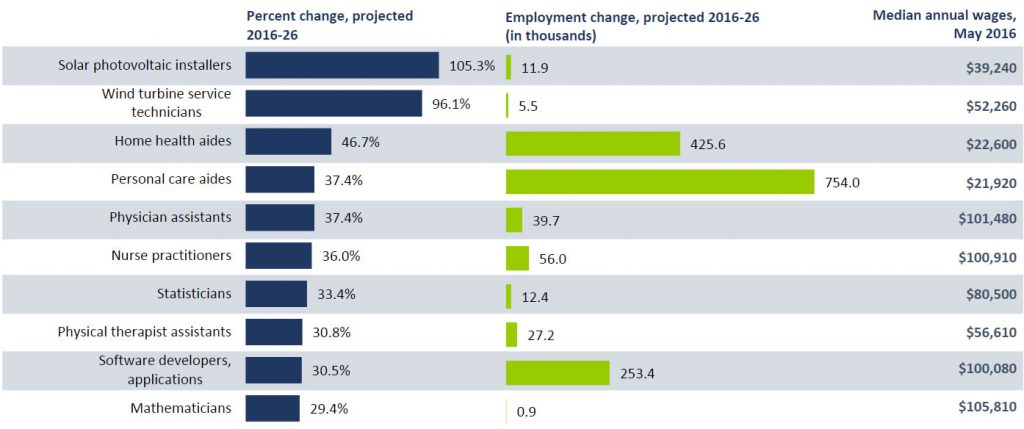 With the beginning of a new year, you may invest time in imagining what your future could hold. Unquestionably, that’s a crucial step to achieve your goals. At the same time, there is a lot to be said for learning about trends that influence our collective future, so that your dreams are built on a solid foundation.
With the beginning of a new year, you may invest time in imagining what your future could hold. Unquestionably, that’s a crucial step to achieve your goals. At the same time, there is a lot to be said for learning about trends that influence our collective future, so that your dreams are built on a solid foundation.
Recently, our colleagues at the Federal Bureau of Labor Statistics (BLS) published their 10-year forecasts for the fastest and slowest growing jobs from 2016-26 (the most up to date authoritative data available.)
The BLS ten fastest growing occupations projected for 2016-26:
 What do these projections mean for the changing landscape of jobs in the United States, and how can you use them for your own career planning? We’ve summed up their findings to create a strong base for your imagination to take off from, and help you set a course for your career in 2018 and beyond.
What do these projections mean for the changing landscape of jobs in the United States, and how can you use them for your own career planning? We’ve summed up their findings to create a strong base for your imagination to take off from, and help you set a course for your career in 2018 and beyond.
1) Health care industry careers continue to dominate growth trends
Economically speaking, the aging of America’s workforce and population has an enormous influence on both the demand for workers in particular jobs, and the overall supply of available workers to fill open jobs. Our very large population of baby boomers increasingly depend on health care to maintain their health and lifestyles, creating a huge demand for a variety of health care workers.
Add to that – longer life expectancies and increasing rates of chronic health conditions, and you can see how solid the demand is likely to continue to be in health care. Not surprisingly then, of the ten fastest-growing jobs, five are in the health care and personal care sector: personal care aides, home health aides, nurse practitioners, physician assistants, and physical therapist assistants. These five occupations alone are projected to make up about 20% of the new jobs created by 2026.
- 2018 Career Tip: If you’re most concerned about job security, or just interested in a helping profession, consider exploring what it would take to train for one of these careers. Health care jobs are also generally hands-on, person to person, so while you may hear about automation as a threat to eliminating other types of jobs, it’s not a large issue in health care. You can expect the stability of demand to continue to be strong.
- Resources: Explore a variety of health care careers on CareerOneStop’s Occupation Profile to learn about typical tasks, education and training requirements, salaries, and projected demand. You can also link from the profiles to look for training or job openings in your local area.
2) There will be many more new jobs in the service sector than the production sector
About 90% of new jobs are projected to be added in the service-providing sector, resulting in more than 10.5 million new jobs over the ten year period. The goods-producing sector is projected to add 219,000 jobs over the same time period. Overall, the production occupations group is projected to decline by 4.1%.
The service industries that are projected to add many new jobs include social service, education, hospitality, transportation, and financial. There will be some growth in goods-producing industries such as mining and construction, but economists expect jobs in the manufacturing industry to decrease.
- 2018 Career Tip: Knowing an industry or occupation is growing is only part of the process for effective career planning. It’s important to understand your own preferences and relate those to a career you plan to pursue.
- Resources: Check out the Interest Assessment on CareerOneStop to identify some service sector careers that fit your interests.
3) Jobs that require higher education will grow faster than jobs requiring a high school diploma only
Compared to jobs that require a high school diploma, jobs that require a bachelor’s degree, or an associate’s degree, or just some college (like a certificate program) are projected to grow twice as fast. Graduate degree jobs will grow quite a bit faster still.
- 2018 Career Tip: Education beyond high school creates more options for almost all workers. It doesn’t necessarily mean a 4-year degree; many jobs open up with a certificate or certification earned in an in-demand field. That said, it can sound as if all the jobs in the next ten years will require a degree, which isn’t true. There will continue to be openings for positions requiring a high school education only, as people in those jobs retire, relocate, or leave for other jobs, but there will be fewer new jobs created at that level than for higher education-level positions.
- Resources: Look for training in your local area in a field that interests you on CareerOneStop’s Local Training Finder; it includes short-term training, 2-year and 4-year degree programs. You can also check out the certifications available in your field on the Certification Finder.
4) People interested in clean energy have some promising options
Clean-energy workers, like solar-panel installers and wind-turbine technicians, are the only occupations that are expected to double by 2026.
- 2018 Career Tip: While these fields are growing quickly, the total number of people working in these fields is relatively small. Also, job openings are not evenly located across the country; there are more openings in states and regions that are better-suited to these forms of energy, and that are investing in developing them.
- Resources: Check out the detailed profiles on solar panel installer or wind turbine technician, or watch a video on solar photovoltaic installers. Find training programs around the country for wind turbine service technician, and solar panel installers, and narrow down to your local area on the Training Finder.
5) If you ever said “I’ll never use this” in math class, surprise! Math skills are in big demand
Other occupations projected to experience fast employment growth in the ten-year period are statisticians, software developers, and mathematicians.
- 2018 Career Tip: Mathematicians and statisticians work in many more fields than most math students ever imagine, including education, marketing, psychology, sports, computer programming, and many other fields that require the collection and analysis of data. Software developers create new applications and programs for almost every industry.
- Resources: Take CareerOneStop’s Skills Profiler to generate a list of careers that use your level of math, computer, operations analysis, and programming skills.
